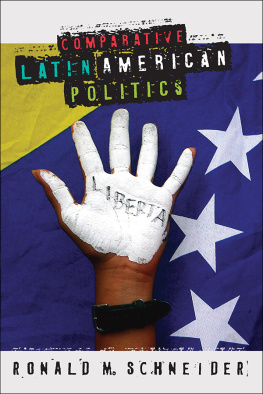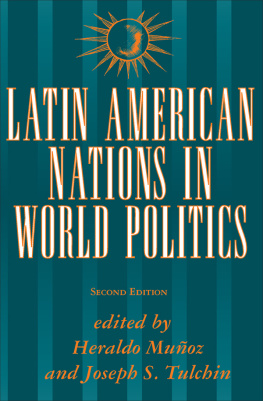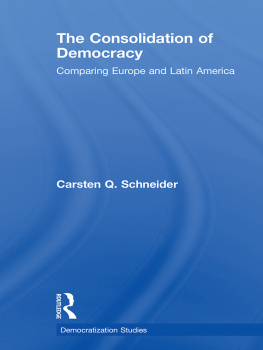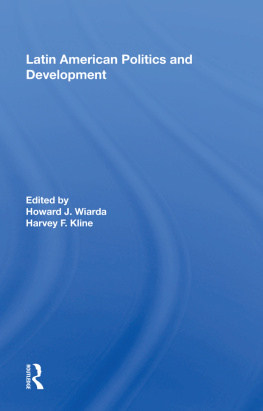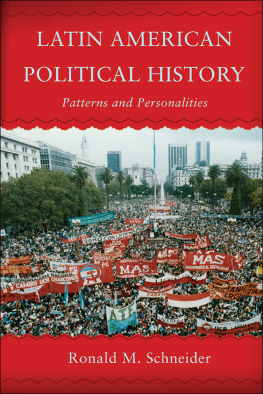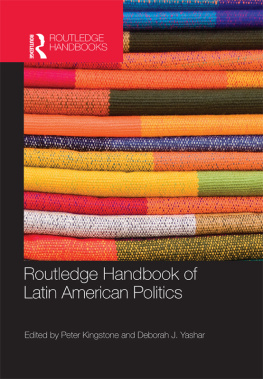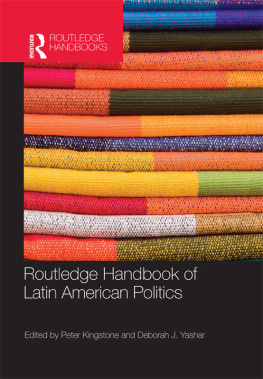First published 2010 by Westview Press
Published 2018 by Routledge
711 Third Avenue, New York, NY 10017, USA
2 Park Square, Milton Park, Abingdon, Oxon OX14 4RN
Routledge is an imprint of the Taylor & Francis Group, an informa business
Copyright 2010 Taylor & Francis
All rights reserved. No part of this book may be reprinted or reproduced or utilised in any form or by any electronic, mechanical, or other means, now known or hereafter invented, including photocopying and recording, or in any information storage or retrieval system, without permission in writing from the publishers.
Notice:
Product or corporate names may be trademarks or registered trademarks, and are used only for identification and explanation without intent to infringe.
Every effort has been made to secure required permissions to use all images, maps, and other art included in this volume.
Set in Bembo by the Perseus Books Group
A CIP catalog record for this book is available from the Library of Congress.
ISBN 13: 9780813344621 (pbk)
Latin America, embracing the diverse array of countries lying south of the United States in the Western Hemisphere, is both a major part of the world and its richest laboratory for understanding the processes of political development and their interaction with economic growth, societal modernization, and cultural influences. Its vast expanse stretches north to south for 7,000 miles from the border between Mexicos Baja California and the most populous state of the United States, Californiaacquired from Mexico by force over a century and a half agoto the southernmost tip of Argentina only a short distance from Antarctica. Since much of the region is farther from the eastern United States than is most of Europe, only a relatively small portion fits the lingering stereotype of being the backyard of the US colossus. Moreover, from that same point south of San Diego to the easternmost bulge of Brazil, Latin America extends more than 5,500 miles from east to west.
The regions differences are so great as to raise the question of whether it has other than geographical meaning, but the term Latin America is firmly rooted in popular usage and embedded in the organization and operations of governments, businesses, and academic institutions. Accurately employed, the term Latin America includes not only the entire South American continent, but also Central America and the Caribbean as well as Mexico. The diversity among its constituent countries is striking in manifold respects: size, population, ethnic makeup, geography, resources, level of economic development, and societal dynamics as well as political development. Even with respect to language Latin America is far from homogeneous, for although it is often misleadingly referred to as Hispanic America, a third of its inhabitants speak Portuguese, Haiti is French speaking, much of the Caribbean has English as its tongue, and millions still know only the indigenous languages of their ancestors. Although Catholicism is by far the predominant religion, there are many tens of millions of Protestants and other tens of millions adhering to religions brought over from Africa or practiced in the hemisphere before the arrival of European colonizers. Not surprisingly, but sadly, lack of understanding and prevalent misconceptions characterize the fragmented and superficial image of Latin America prevailing in the United States as well as in the rest of the world.
The independence of Latin American countries came typically in the 1820s, well over a century before that of most of the Afro-Asian world. Hence a close examination of Latin Americas struggles to establish viable participatory political systems provides valuable lessons concerning national consolidation and political development in new nations. Latin Americas experience strongly indicates that both political institutions and their requisite congruent political culture are built over generations. Even decades prove time and time again to be far too brief and transitory spans to measure fundamental trends as opposed to mere political fads, fancies, and fashions. Moreover, because by far the greatest number of recent cases of successful democratization are found in Latin America, this region most urgently requires thoughtful comparative study. Indeed, a major aim of this book is to identify, analyze, and highlight salient lessons from Latin American experience for the current new nations of the Afro-Asian world. In this regard, the 18201930 span is more relevant in many respects than recent times, since that is when the countries analyzed here were coping with the array of postindependence problems and challenges of national consolidation that still plague over half the nations of the world. Also, at a time when the nations of eastern Europe are still attempting to install viable democratic systems, and those spun off along Russias Asian borders are even less advanced along this treacherous road, a deeper and more systematic understanding of the analogous processes in Latin America is certainly required. Here the trials and tribulations of the late nineteenth century up through the 1920s hold more lessons than does more recent Latin American experience.
Textbooks on Latin American politics are either so massive as to be prohibitively forbidding or so streamlined as to omit any significant historical background and a coherent discussion of individual countries. Often adhering to a public policy approach, they focus on present-day governmental structures, political processes, and policy issuessacrificing analysis of the paths by which countries, and by extension the region, arrived where they are today. This is precisely the center of my concern: to compare the political development experiences of Latin American nations.
A major challenge in understanding Latin America is its great diversity, underscored by the immense ethnic, historical, and geographic differences among its main components. The contrasts between the two nations that together contain over half the regions population at first glance overshadow any similarities, an impression only slightly reduced by closer examination and greater familiarity: Brazil is South American, Portuguese-speaking, very heavily African-influenced, and distant from the United States. Mexico is North American, Spanish-speaking, deeply Indian-influenced, and immediately proximate to the United States. Further complicating the analytical problem is the fact that the second most important pair of countries differ strikingly from each other as well as from both of the dominant dyad. Argentina is at the southern tip of South America, and Colombia borders the Caribbean. The former is largely populated by individuals of relatively recent Italian descent and enjoys close European ties; the latters population is heavily mestizo (mixed Indian-European) with most of its European component descended from Spaniards who arrived during the colonial era, so it lacks Argentinas close trade and financial links to present-day Europe. The Pacific-facing South American nation of Peru is heavily Indian, whereas Venezuela and Chile are significantly more European. Together these seven countries, ranging from the regions northernmost to its southern tip and bordering both the Atlantic and the Pacific Oceans, contain four-fifths of the regions inhabitants as well as an even higher proportion of its economy. Hence, for sound reasons of parsimony and taking into account what is possible to cover within the limits of a one-semester course, they are the subject of this text.
For all its advances since rejection of the intellectually sterile historical, legalistic, institutional approach inherited from Woodrow Wilson gained headway in the 1950s, political science still lacks a single, unified, all-embracing theoretical approach. Simplistic, not necessarily simple, theories about why Latin America lags behind English-speaking North America are inadequate. Dependency theory, which in the 1960s and 1970s was embraced by the majority of young scholars in the Latin American field, went too far in putting the blame on external factors and downplaying internal ones. Useful as a corrective to traditional institutionalism as well as deterministic versions of modernization theory, it threw the babies out with the bathwater. With the demise of the Soviet Union at the end of the 1980s, essentially economic determinist dependency approaches entered into a steep decline. The vacuum has been partially filled by a mix of new institutionalism and the revival of a far less mechanical and more realistic version of modernization theories tempered with concern about cultural factors. This last approach is close to my slant on analyzing and interpreting Latin American politics, and it is followed in this text as being nearest to the enduring mainstream of comparative politics.

